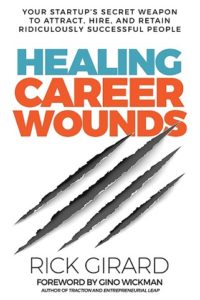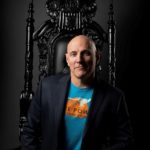
Entrepreneurs establish their start-up businesses to succeed, thrive, and live amazing lives. For a business to prosper, its people should be determined, productive, and always contribute value and build the organization. However, successful hiring is not an easy task. In this Alicia Dunams’ interview with Rick Girard, you’ll find out that although there are challenges you will encounter, hiring the right people is possible. Rick is the CEO of Stride Search, the host of Hire Power Radio, and the author of Healing Career Wounds. Passionate about helping start-up founders win, he developed and systematized the Hiring Operating System (HireOS), a process for leaders to win the strongest hires. Learn how you can successfully hire great talent as Rick shares some creative strategies to attract, hire, and retain successful people.
—
Listen to the podcast here
Healing Career Wounds With Rick Girard
Let’s discover perspective, possibility, and purpose from the pages of real life. We’re talking to the noteworthy author, Rick Girard, and this is episode 38.
—
Rick, it’s so great to have you.
It’s great to be here. Thank you for having me, Alicia.
Let’s share a little bit about you. I have your bio here. Rick, you’re just a guy who is passionate about helping startup founders win. You have developed and systemized the hiring operating system called HireOS. This is a process for leaders to win the strongest hires. It’s creative, articulate, balanced, collaborative and inclusive. That’s you too.
I try to make everything about me apparently.
That’s what we’re here to do. It’s to focus on you. You are the author of Healing Career Wounds and you’re a radio podcast host for Hire Power Radio, which is on LinkedIn Live, correct?
Yes. It’s hire. It’s not a religious show, so it’s not higher.
Aligning yourself with the right people will lead you to succeed.
We’re keeping this around career, so it’s hire. You’re helping people hire and you have a strong social media presence, podcast audience, and public speaking. You have mad street cred and you’re based out of Orange County. I’d be remiss not to say that when you’re not running a school for gifted mutants as Professor X that you host the Hire Power Radio show, which is on LinkedIn Live and that it’s a business leader’s resource to solve their most difficult hiring challenges. You also compete in Brazilian jujitsu and have an affinity for adrenaline-pumping activities such as surfing, snowboarding, rock climbing, and running with scissors.
When I’m feeling a little crazy, I’ll run around the office.
You have a wife, child and dog. They get to be at the top and they put up with you for some unknown reason. It’s so great to have you here.
It’s great to be here. Thank you for having me. That’s a great introduction, by the way. I think of myself as just a guy. I love helping entrepreneurs win and that’s the whole reason for the book and what I do. I’m good at hiring, not so good at a lot of other things.
That’s what we’re going to jump in here. Let’s talk about your book. Why did you write Healing Career Wounds?
To scale my operation and give entrepreneurs the opportunity to be able to do what I’ve been able to help some of my clients do throughout the years. I learned throughout this whole process that the root of all the hiring problems is not having a recruiting process. Recruiting and hiring are two separate things. You have to think of those. Everybody puts a lot of money into a recruiting process, but they don’t know how to hire. What we found was that the root of all the problems came from the executives. We never thought like you go to business school and you’re never taught how to interview people. Interviews are a bunch of questions that you thought were good questions that you acquired throughout the years that somebody else asked you, and so you go, “I like that question. I’m going to use that when I interview.” They’re not tied to anything within your organization. What it inspired me to do was to be able to give people a blueprint that they can plug into their business and essentially run their business through like having a hiring system they can plug in.

You said there’s recruiting and then there’s hiring. People don’t have some basic interview people skills to be able to hone in on who’s the best person to hire for a job. Your book and what you do for entrepreneurs, startups and corporations, the work you do in this world is so needed as we are opening up since the pandemic. The workplace has shifted. Workplaces have closed, running remote, and are changing. At the beginning of the pandemic, it felt like no one was making any money, but as we come out of the pandemic, it feels like the economy is doing better than ever, at least in some states, and then there are more billionaires, and billionaires are making more money. It seems like a lot of businesses have been able to streamline and even streamline their hiring. People are working from their homes, and also people don’t want to go back to work. There’s a lot of stuff going on. What are the challenges that we’ve had? How are you turning into possibilities for you and your clients?
These challenges, we look at them from the perspective of being able to opportunistically embrace what they are. The other thing is you have Millennials and Gen Z now that are driving the way the workforce runs. We’ve learned that they are far more interested in the quality of life. They want to be able to identify with the company and tie to a cause. Cultural and corporate values are far more important to them than they were to my generation. It’s not about just getting a paycheck, it’s about aligning with your corporate values and building your processes, especially your interview process around that. That’s essentially like the opportunity. Those are the challenges that we have, and that’s what the book does. It builds everything from your core values. It doesn’t matter what your core values are, you have to own them and live them, and then you build everything around them.
We have challenges. Every decade and industry are going to have their own individual challenges. In particular, we’re coming out of the pandemic and having challenges. The culture is going to be the solution.
Being true to what your culture is. You can have a hunter culture that’s backstabbing and all about numbers, but own it and be honest with it and put it out there. You’re going to attract people who thrive in that environment. Where companies get in trouble is when they try to hire somebody who’s collaborative and has this kumbaya attitude. They don’t do well, and then you have all of a sudden, a hostile work environment.
That’s interesting because there are going to be companies that are dog-eat-dog. They’re going to attract people who are hungry for sales, who love the energy of that. They want to make money. They’re fine with maybe the transactional culture of the workplace or winner takes all type attitude. Where people get in trouble is if they hire someone who doesn’t align with their particular values. That can get companies in trouble too in terms of hiring and all of that because there are particular standards versus legally hiring. There are some checks and balances in place.
People will opt out of a situation when they know it’s not right for them. If you say, “We’re all about numbers and we’re 100% numbers-driven. You’ll get attention from us when you provide money back to the company.” As long as you’re putting it out there, people who are the wrong people for the organization will say, “That’s not me. I don’t want to work here.” That’s a good thing. It’s not about filling the seat. It’s about getting the right person in the seat that’s going to thrive.
Can companies get in trouble if they’re very transparent with their culture and if the culture is not a mainstream or PC?
I haven’t heard of any that have. If you own it and you put it out there, how can you get in trouble? We’ve been putting it out there and we hire based on our corporate values. As long as you align with them, then we’ve got a fit. If not, please go somewhere else where you’re going to thrive. I haven’t come across one company that we’ve worked with yet that’s put that out there that’s gotten sued for any reason.
Writing a book is the most rewarding thing that you could imagine accomplishing and have done. Have fun with it.
You’re encouraging your clients to be transparent, and what I call it is vibrational. Like people, you attract people. If you vibrate at a certain level, people are either going to be attracted to you or they’ll fall away, and you almost don’t even have to do anything. You just be who you ought to be. You stand for your own particular values. I know this is a business book and is focused on leaders in the entrepreneurial space. I like to extract it out to hear some life lessons. What are some life lessons that you have learned through writing this book and also through your work with entrepreneurs and startups?
Life lessons for me or takeaways from the book?
Takeaways from the book. First of all, everyone who’s reading, you can purchase Healing Career Wounds at Amazon.com. This is a great time to go over there and purchase it. I’d love for you to jump in some salient lessons that you have in your book.
One of the key things is that if you’re an entrepreneur, you need to own hiring. Making the strongest hire should be your strongest talent. It’s about making you good at something that is so core and fundamentally important to your organization and your organizational growth. It’s not about evaluating skills. It’s about understanding what a person’s transferable skills are, but more importantly, what they’ve accomplished and how they can bring that over to your organization. It’s about positioning, understanding what that person wants before you sell them a job, and taking what you know about hiring and flipping it upside down.
I joke around in my book about I had a moment where I watched that episode of Seinfeld where George Costanza did the opposite of everything that he normally would do. As a result, his life totally turned around. He got a job with the Yankees. He moved out of his parents’ house and got a girlfriend. Great things were happening for him. Look at hiring that way. Hiring isn’t this cumbersome, terrible task that everybody hates. They hate it because they do it wrong. If you make yourself good at it, then it becomes fun, enjoyable, and something that is the building block of your company being successful.
What else do you have for us in terms of your book and some key takeaways for entrepreneurs and business owners out there?
There are a couple of things. If you’re building an organization, the number one thing, even if you’re starting a small company with 2 or 3 people and you’re building something from scratch, the investors are going to invest in the team. They invest in the jockey, not the horse. The most important thing is who you have onboard on the team and aligning yourself with the right people, not people who are “vanity hires,” somebody from Google or somebody who’s got a good school they come from. Somebody who’s positioned well with the organization, who brings a track record of accomplishment, a lot of passion for the business, and is driving things for the organization. That’s who investors invest in.

I wanted to speak into that a little bit. A lot of the startups you work with are in technology and software. In this world, working for someone like Google or Facebook, does that have street cred in terms of being able to be hirable moving forward? That’s interesting. You and I sat down on your podcast and talked about the power of personal branding, how writing a book is paramount in terms of building your personal brand, speaking keynotes, being a panelist, appearing on TV, and being a thought leader in your area of expertise. I’m curious. What are some of your tips? You focus on the employer. Is personal branding something that they’re looking for in terms of employees?
It’s been my experience that it looks good to investors if you get somebody from Google. You can brag about it and get some bragging rights. There’s nothing wrong with getting somebody like that unless it’s somebody who’s not properly positioned. If you’re a startup with five people and you’ve got somebody who you’re pulling out of Google, who’s been there for 5 to 10 years, and they’re used to having a lot of resources to get back to three types of DNA of people that I’ve found. You have people who are builders, good at finding things that are broken and improving them, and then you have maintainers. You get a lot of large company people who are in a maintenance mode and they like doing their work, going home, and working their 40-hour workweek and moving on from there. That’s probably the bulk of the population.
We have a job and we can get a paycheck, so we can spend time with our family, but there are those people who thrive in building things. If you’re a startup, you need to find people who are positioned well who are builders. If somebody is a builder, it doesn’t matter where they come from or where they’ve worked at, they’re going to help you build the organization. Don’t chase people from Google, but if you find somebody who’s from Google, who’s maybe not properly positioned at a brand company, they’re a builder, but they’re stuck in a maintenance role, so they’re unhappy, then you’ve got a winner-winner. You want to move forward with them. Otherwise, I don’t think it brings any value to the organization. In fact, I’ve talked to a lot of CEOs that have said the worst hire that I ever made was when I pulled somebody from XYZ company.
That’s a great framework that you shared with us in terms of builders and maintainers. I want to jump into a speed round to learn more about you. I’m going to ask you some questions and you get to say the first thing that comes to mind. What author has contributed significantly to your life?
Gino Wickman who wrote Traction.
What life lesson do you wish you learned earlier on?
Many of them. I do everything wrong until I get it right. Now I’m packed in with work, so I’ve been writing technical manuals and training things. We’re taking the book a little bit further and scaling out the business. We have a digital platform that people can sign up and start running HireOS through their organization.
Successful hiring is in the positioning. It’s about understanding what that person wants before you sell them a job.
What is your legacy? What are you going to leave behind?
Hopefully, the HireOS framework, and have that be a standard for companies that come up through the startup ranks. The most effective use of this tool is for companies that are very small scale and then letting them grow that within the organization.
What is your favorite book?
You want outside of Healing Career Wounds?
That’s not fair, someone else’s book.
There’s a book called The Wisdom of Teams, which I read quite a long time ago. I forget who the author is. I’m sorry. It’s something that always resonated with me, and I pulled a lot of strong lessons from that. I continue to go back to that and read it quite often.
With that, I would love to hear how do people find out more about you, hire you for their startup, and purchase your book? Tell me all the ins and outs of how to find you.
You can find the book anywhere on Amazon and Barnes and Noble. It’s pretty much on all the platforms. It’s called Healing Career Wounds. That’s the cover. I mentioned Gino Wickman. He was kind enough to write the foreword for the book, which I was excited about. You can also find the podcast on any of the podcast players. It’s Hire Power Radio. You can go to HirePowerRadio.com. It’s on the various podcast platforms as well, or you can find me at StrideSearch.com.

Rick, it has been so great to have you here. I would love for you to share before you go one piece of advice for our audience.
This will pertain to you because I was fortunate enough to work with Alicia, and she helped me out a whole bunch with my book launch. Writing a book is never what you expect it to be, but it’s probably the most rewarding thing that you could possibly imagine to accomplish and have done. It’s like I’ve never had a baby personally, but my wife did. I remember that last trimester she’s like, “I just want it out of me.” The last 90 days are like that, so have fun with it.
Congratulations on writing your book, Rick. It’s been so great to have you here.
Thanks so much for having me.
Everyone, check out Rick Girard and Healing Career Wounds. Take care, everyone. See you next time.
Important Links:
- Rick Girard
- Healing Career Wounds
- Hire Power Radio
- Podcast – Hire Power Radio (Your Book can Attract Talent with Alicia Dunams) episode
- Traction
- The Wisdom of Teams
- Barnes and Noble – Healing Career Wounds: Your Start-up’s Secret Weapon to Attract, Hire, and Retain Ridiculously Successful People
About Rick Girard
 NAME: Rick Girard
NAME: Rick Girard